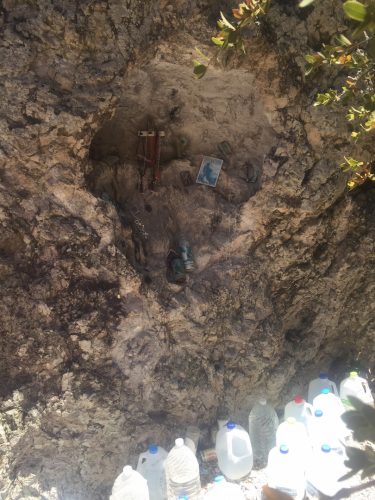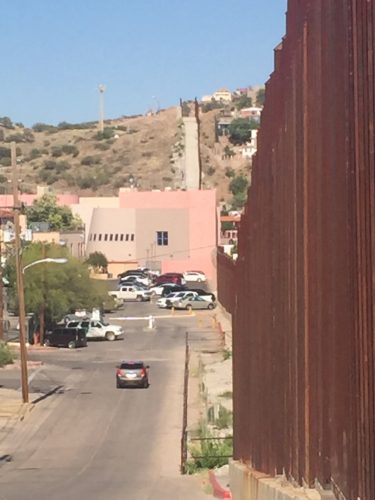
I had heard about the border in many occasions, being from the experiences of my parents, educational lessons and the media, yet nothing compares to personal experience. That is what my first week in Tucson taught me. Going to Operation Streamline, a process in which up to 70 immigrants are criminalized in less than an hour, showed flaws in the system. There was lack of understanding in the part of the immigrants who were prompted by the judge and other immigrants to answer a certain way. Several microphones were laid out in front and about 8 immigrants would go in front of the magistrate judge, who only asked the question once and moved on to the next person asking, “do you?” It was heartbreaking to see how we, as society, treat immigrants. In one case the US. Attorney referred to someone as “a threat to society.” We allow U.S. citizens to get away with much more, yet sentence immigrants to bails so high they will never afford. Increased presence of border patrol has forced immigrants to cross through the most dangerous parts.

Immigrants cross through the Arizona desert every day, in remote trails not easily accessible. Groups such as No More Deaths, aim to place water jugs and snacks in places commonly traveled by migrants, in an effort to prevent deaths and decrease risks they face. As a group we did a water drop in Arivaca, AZ with a No More Deaths volunteer, where we walked on steep parts, rock climbed a portion and I ended up with several scratches and sore. The nicer weather made it easier but I cannot imagine how unbearably hot in can get or how cold it can be during the winter. This was a migrant made path, not one man-made and entirely safe to walk on. I kept looking down to make sure I didn’t lose my footing or slip. There were rusty cans, water jugs and articles of clothes scattered throughout reminding us that this was a journey many completed but that not all make it. An altar full of rosaries, crosses, and photos of a teenager whose remains were found nearby saddened me because people shouldn’t have to suffer so much just to make it to the United States.

The Nogales border then made this all that more about politics and perceptions of the border. I had always pictured a fence that stretched through most of the border and desert. Yet what I saw was a wall so high with cameras scattered throughout that it was impossible for anyone to ever cross. It emphasized how highly politicized immigration has become. We make it so difficult for people do something that is inherently a human right, to migrate. We politicize humanitarian aid when it should not have to be. Why is it that aiding immigrants, because they too are humans, has to mean we are taking a stand? The border just made it all that more real. I have met countless of individuals who have aided immigrants, given them rides, a phone to call home, shelter and food. And when I hear why, it’s always because they don’t deserve to be treated as less than human. The wall in Nogales has disrupted the community and goes right through the town. Nogales is a town in both Mexico and the US and through the small spaces in between this wall we could see through to Mexico, people living their lives as if the wall did not exist. The truth is, our political leaders and representatives are making decisions from Washington, far away from the border, not knowing how their decisions actually impact our communities.
The partner organization I have been working with is Casa Mariposa. Casa Mariposa a place that provides community, support and a place to live to individuals affected by the criminalization of migration or that have previously been in detention. It also has a visitation program where volunteers can visit detainees to provide company and support. When I came in it was hard to hear they were losing the house in September, but I was excited to know I would play a part in fundraising this summer. I got to know the individuals who live in the house and in a way it felt like a home away from home. On Wednesdays they host a community dinner that I am a part of and it always impresses me how much the community has done and continues to do. I get to read letters sent to the visitation program. It is heartbreaking to read the stories of individuals and feel powerless in not being able to do much. Many write, hoping we can help and unfortunately we don’t have the financial means to bail people out or provide legal help.
As part of the visitation program I got to go to the Eloy detention center. I was a bit nervous and anxious because I had never been to a prison or detention center. All I had were images from shows and movies, yet it was nothing like it. There were seats in a room, we all went in and slowly all the prisoners were let into the room. I had pictured a room with tables and guards and the warden watching over us but it wasn’t like that. It was much more causal and felt normal. I was anxious about not knowing what to say, but I found that it came naturally. Conversation could be slow to start, but they all warmed up to me and told me stories that I will never forget. From their treacherous journeys in cold freezing weather to how violence had impacted their lives, I empathized with their pain. One woman was reluctant to share specifics at first but after getting her to laugh and joke with me she broke down and I found myself crying with her. It was once again painful to feel helpless because I wish I could do more yet there is nothing more I could do. Another woman, finally made me realize why I was there. It wasn’t necessarily to help them get out, but it was to be a listening ear as they for the first time said what had been circling around their minds for a long time. I was there to hear them out, provide comfort, friendship, human interaction and some laughter.
The criminalization of migration has impacted the lives of many, benefitting only prisons who make money out of keeping immigrants in jail, yet they treat them inhumanely, paying them only a dollar a day for any work they do. The way we see immigration needs to change, because in the process we forget that it should not be wrong to migrate and we shouldn’t be making it so hard. Migration is a human right and should not be a crime. My first two weeks have been eye-opening, impactful and I can’t wait to see what more this summer brings.
